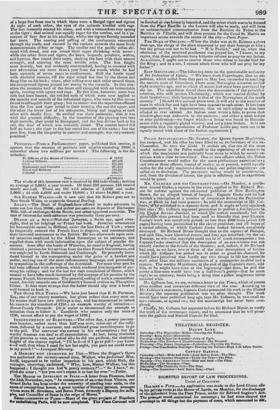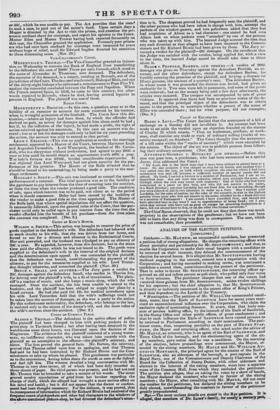DIGESTED REPORT" OF LAW PROCEEDINGS. „ .
COURT OF.,COANCERY:
• - Hoteme PIPE.., -An application was.made to the Lord Chanc ellr
in hisprivUSeFetiln at the House-of . Lords, on Monday, for the discharg9 Of the defendant from the Fleet Prison, under Sir Edward Sugd en's Act. The prisoner stood committed for contempt ; he had since cleared the contempt in all things but the payment of costs, which amounted to 401.
COURT OF KING'S BENCH.
WILSON V. SMITH.—This action was brought to recover the price of goods supplied to the defendant's wife. The defendant had behaved with
so much cruelty to his wife, that she was driven from her home, and
forced to sue for a divorce and alimony in the Ecclesiastical Courts. Her suit prevailed, and the husband was adjudged to pay an alimony of 301. a year. He appealed, however, from this decision, but in the mean time paid the alimony, which he was not bound to do. The goods were supplied to the defendant's wife in the interval of the original decision and the determination upon appeal. It was contended by the plaintiff, that the defendant was bound, notwithstanding the payment of the alimony, to pay for the necessaries supplied to his wife. Lord Tenter- den thought otherwise, and nonsuited the plaintiff. (Nov. 30.) BRUCE a. SMALL AND ANoTHea.—The Jury gave a verdict for 301. damages against the defendant Small, who resides in Thavies Inn, for-driving over the plaintiff's wife, in a fit of intoxication. The plain- tiff is a teacher of music, and also keeps a music-shop, which the wife managed. Since the accident, she has been unable to attend to the business, and the plaintiff has been obliged to supply her place by a hired servant. He had also paid 151. 10s. for medical attendance upon his wife. Lord Tenterden held that the wife's sufferings could not be taken into the account of damages, as she was a party to the action. By this unfortunate technicality, the defendant, who belongs to the law, is mulcted only to the extent of the doctor's bill, and the mere value of the wife's services since the accident. (Dec. 2.)
COURT OF CON/40N PLEAS.
Amsost v. THosras.—The defendant is the active officer of police. The plaintiff had been charged by him with picking pockets at the print-shop in Tavistock Street ; but after having been detained in the watchhouse some three hours, was liberated upon the decision of the Magistrate. The evidence for the plaintiff consisted of a young water- man, an indifferent character, who was taken into custody with the plaintiff as an accomplice in the offence—the plaintiff's attorney, and sister. The first proved the general facts. Mr. Barton, the attorney, proved that Thomas called upon him to apologize, and that Thomas had said he had been instructed by Sir Richard Birnie and the Com- missioners to take up whom he pleased. This gentleman was particular as to the expressions, having taken down the words as soon as the defend- ant had left him. The witness detailed a long conversation with Mr. Thomas in very close terms, all of which had been duly recorded on three sheets of paper. No third person was present, and he had not told Mr. Thomas that he intended to take a minute of his words. The sister proved sundry ejaculations of grief from her brother regarding the charge of theft, which she alleged had wrought a most serious effect on his mind and health ; but it did not appear that the doctor or confine- ment had been thought necessary. For the defence, it was proved, that in consequence of information which Sir Richard Birnie had received of the frequent resort of pickpockets and other bad characters to the windows of the above-mentioned picture-shop, he had directed the defendant's atten- or 50/., which he was unable to pay. The Act provides that the costs' in such a case, be paid out of the suitor's fund. Upon certain days a Matter is directed by the Act to visit the prison, and examine the pH.. soners confined there for contempt, and report his opinion to the Court. Master Eden and Master Trower having both reported favourably on this case, the Chancellor granted the application. Formerly poor prison- ers who had once been confined for contempt were immured for years without hope of relief, until Sir Edward Sugden directed his attention to these distressing cases. (Nov. 29.)
VICE-C HANCELLOS'S COVET.
MERENVILLE V. THOMAS.—The Vice-Chancellor granted an injunc- tion on Wednesday to restrain the Bank of England from transferring to the defendant the sum of 70001. Three per cent. Consols,whieh stood in the name of Alexander de Thomines, now deceased. The defendant, the executor of the deceased, is a notary, residing at Brussels, out of the jurisdiction of the Court. The deceased was formerly Bishop of Blois, and one of the thirty-eight bishops who addressed a remonstrance to Pope Pius VI. against the concordat concluded between the Pope and Napoleon. When the French entered Spain, in 1808, he came to this country, but after- wards repaired to Brussels, where he died, leaving several legacies to persons in England. The plaintiff was one of them.
ROLLS COURT.
MONEYPENNY V. BRISCOE.—In this case, a question arose as to the liability of an executor to account for rents received by his testator, when in wrongful possession of the freehold. The Court drew this dis- tinotion,—where an injury had been done, by which the offender had derived no gain, an action for damages against him alone could be had ; but if, by the infliction of the injury, he had made a profit, the right of action survived against his executors. In this case an account was de- creed ; but as at law the damages could only be laid for six years preceding the action, the account was only to extend to that period. LEGH V. ERSKINE.—This was an application to confirm the marriage settlement, approved by a Master of the Court, between Marianne Legh and Augustus Cavendish. Lord Waterpark, the brother of Mr. Caven- dish, who is a clergyman without preferment, had agreed to pay 2001. a year to him until he should obtain an appointment worth 4001. a year. Tee lady's fortune was 60001., besides considerable expectancies. It was objected that Lord Waterpark had not given security for the per- formance of his promise. The Master of the Rolls directed that he should be bound to his undertaking, by being made a party to the mar- riage settlement.
HOGGART V. SCOTT.—This suit was instituted to compel the specific performance of a contract. The chief question was as to the liability of the pprchaser to pay interest from the time of entering into the contract, or from the time when the vender produced a good title. The condition of sale, upon which interest was to be paid, was silent as to the period when it should commence. Delay had been caused by the inability. of the vendor to make a good title at the time appointed. The Master of the Rolls held, that where special stipulations did not affect the question, it necessarily followed, upon the general rules of the Court, that the pur- chaser could only be called upon.to pay interest from the time that the vendor afforded him the benefit of his purchase—from the time.wjaen the contract was completed. (Dec. 3.)
tion to it. The shopman proved he had frequently seen the plaintiff, and the other persons who had been taken io charge with him, attempt the pockets of the window-gazers, and two policemen added that they had had suspicions of Alison as a bad character : one stated he had seen Alison look on when pockets were " sounded" by one of the persons who was taken up with him. The learned Judge scouted the idea that any such direction as that alleged to have been imputed to the Commis- sioners and Sir Richard Birnie had been given by them. The Jury re- turned a verdict for the plaintiff-201. damages. On the certificate that the Judge was satisfied with the verdict, being applied for, with a view to the costs, the learned Judge stated he should take time to think about it.
BRAGC V. PENPOLD, BARBER, AND OTHERS.—A verdict of 2001. damages was given on Thursday against the defendant Penfold, an at- torney, and the other defendants, except the defendant Barber, for- forcibly entering the premises of the plaintiff, and levying a distress for fifteen guineas, the amount of a quarter's rent. The defendant Barber, in whose name it was pretended the distress was levied, had given no authority for it. Two men were left in possession, and some of the goods were removed ; but on the money being paid a few days afterwards, the articles were restored. The trespass was accompanied by acts of great violence. It appeared that there had been no previous notice of the de- mand, and that the principal object of the defendants was to obtain access to the premises, to ascertain whether a person of the name of Ellice was concealed there ; but for what purpose, did not transpire.. (Dec. 3.)
COURT OF ExcuEQUER-
BEGRI v. LEN-T.—The Court decided that the acceptance of a bill of exchange on a Sunday did not invalidate it. An attempt had been made to set aside the verdict upon an objection founded on the statute of Charles II. which enacts, " That no tradesman, artificer, or work- man, shall exercise any trade or work of ordinary calling (works of ne- cessity excepted) on Sundays." The Court thought that the acceptance of a bill came within the "works of necessity" which were excepted by the statute. The object of the act was to prohibit persons from follow- ing their ordinary occupations. (Nov. 29.) ATTORNEY-GENERAL V. HINCKLEY AND OTHERS:—Before this case was gone into, a gentleman, who had been summoned as a special Juror, thus addressed the Court : " My Lord, this is the third time that I have been obliged to attend here as a juror. On one occasion I was obliged to stop for six hours, and another time I was called into the box, on both which occasions the trial for which I had been summoned was sent off, because a sufficient number of special jurors did not attend. My Lord, t am not a banker or a member of Parliament, but I am an in- dependent man. Are our laws like cobwebs, which may entangle the poor, and through which the rich may break with impunity ? One of those who had been summoned as a juror on this trial, and who did not answer to his name, is a Bank director; yet your Lordship has not fined him for not attending, though you were obliged to call in two talesmen to make up a Jury. May I entreat your Lordship, for the sake of justice, for the sake of the country, to fine in the highest penalty every juror who will not answer to his name, whether he be a Bank director or a member of Parliament ? I am unwell, I have a swelled face, and should not have attended here to-day were I not in apprehension of being fined; yet I per- ceive that several who have not as good an. psokise fur absenting themselves as I have, did not attend here to-day, or on, the ogler two former oecasions."
The Chief Baron observed, that he could not deny, that there was much propriety in the observations of the gentleman; but we have not been able to learn that any thing was clOne in consequence. The case, which was not remarkable, then proceeded. .



























 Previous page
Previous page